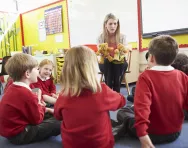Important update from TheSchoolRun
For the past 13 years, TheSchoolRun has been run by a small team of mums working from home, dedicated to providing quality educational resources to primary school parents. Unfortunately, rising supplier costs and falling revenue have made it impossible for us to continue operating, and we’ve had to make the difficult decision to close. The good news: We’ve arranged for another educational provider to take over many of our resources. These will be hosted on a new portal, where the content will be updated and expanded to support your child’s learning.
What this means for subscribers:
- Your subscription is still active, and for now, you can keep using the website as normal — just log in with your usual details to access all our articles and resources*.
- In a few months, all resources will move to the new portal. You’ll continue to have access there until your subscription ends. We’ll send you full details nearer the time.
- As a thank you for your support, we’ll also be sending you 16 primary school eBooks (worth £108.84) to download and keep.
A few changes to be aware of:
- The Learning Journey weekly email has ended, but your child’s plan will still be updated on your dashboard each Monday. Just log in to see the recommended worksheets.
- The 11+ weekly emails have now ended. We sent you all the remaining emails in the series at the end of March — please check your inbox (and spam folder) if you haven’t seen them. You can also follow the full programme here: 11+ Learning Journey.
If you have any questions, please contact us at [email protected]. Thank you for being part of our journey it’s been a privilege to support your family’s learning.
*If you need to reset your password, it will still work as usual. Please check your spam folder if the reset email doesn’t appear in your inbox.
Assemblies and collective worship in primary schools

We all remember assemblies from our own primary school days: sitting cross-legged on the hall floor, belting out Morning has Broken and saying a loud ‘Amen!’ at the end of the Lord’s Prayer.


Start a unique learning programme!
- Weekly programme for each school year
- Worksheets sent direct to your inbox
- Keeps your child's learning on track
Assemblies are still an important part of school life. Indeed, the Department for Education (DfE) specifies that all schools must hold a daily act of collective worship, and while this doesn’t have to take the form of an assembly, it very often does.
What happens in primary school assemblies?
Schools have a number of different approaches to assemblies. These will depend on factors such as the size of the school, the background of pupils, and the faiths represented in the school community.
In general, assemblies have moved on from the ‘hymns and prayers’ formula that many of us encountered at school.
Examples include:
- A weekly celebration assembly where pupils’ achievements in the classroom and out (such as in sports teams) are rewarded.
- An assembly based on materials from a charity or organisation: many provide assembly plans, including UNICEF, CAFOD and the Woodland Trust.
- A talk from a visiting speaker or performer, for example a sports personality, musician or author, or a representative of a charity like Childline.
- A series of assemblies focusing on a school value: truth, kindness, respect, etc.
- An assembly tied in with a nationwide event or awareness campaign, such as Anti-Bullying Week or World Book Day.
- Bible-based assemblies where pupils look at a passage from the Bible in depth, often led by a local member of clergy, and sing related songs.
- An assembly based on current affairs, such as climate change or food poverty.
- Assemblies to address an issue that is affecting pupils, such as bad behaviour at playtimes.
- A class assembly, where one class each week leads the assembly, usually showing what they’ve been learning, e.g. through showing work, drama, dance and music.
- Singing assemblies where children learn new songs, perhaps for performing in a school concert.
Many charities and other organisations, including church groups, provide assembly plans for one-off assemblies or ongoing series that schools can use, although they can, of course, devise their own material.
Assemblies are typically held at the start of the day, although they don’t have to be.
They may be whole-school gatherings, or include just a few classes at a time: this often depends on the size of the school and whether it has a big enough space to accommodate everyone in one go.
Most schools occasionally involve parents in assemblies in some way, for example by inviting them to class or celebration assemblies.
What does collective worship mean?
In accordance with DfE legislation, all schools must hold a daily act of collective worship that must be ‘wholly or mainly of a broadly Christian character.’
This is a contentious subject, particularly in non-faith schools, which many parents believe should teach solely secular values.
However, the definitions of both collective worship and Christian character are broad.
The DfE specifies that:
- Worship should not be specific to any particular Christian denomination, e.g. Baptist or Catholic.
- Acts of worship can be broadly in the tradition of another religion, as long as they conform to Christian values.
- The majority of collective worship across the term should have a Christian character, but not every act of worship must.
- Assemblies can include non-Christian material without depriving them of their Christian character.
- Assemblies can include elements common to other religions as well as Christianity.
In many cases, the so-called Christian content of assemblies is tenuous. For example, school values are often in line with Christian values such as truth, justice and forgiveness, and so can be delivered without any reference to the Bible.
Nevertheless, the DfE states that collective worship ‘must contain some elements which relate specifically to the traditions of Christian belief, which accord a special status to Jesus Christ.’
Collective worship usually takes place within schools, but may happen off-site on occasion, for example through pupils taking part in Easter or Harvest celebrations in a local church.
What do people think about collective worship?
Unsurprisingly, the issue of Christian collective worship is divisive.
‘We would like to see the outdated legal requirement for a daily act of collective worship that is broadly Christian in character replaced with inclusive assemblies that are suitable for all children, regardless of background,’ says Dr Ruth Wareham, Education Campaigns Manager with Humanists UK.
Indeed, Humanists UK has recently launched its own free online resource, Assemblies for All, to help schools plan alternatives to Christian acts of worship.
The Church of England, however – which is affiliated with 4,644 schools in England – supports collective worship with a Christian character.
‘It’s a key opportunity to explore and understand the values and virtues that underpin the school’s ethos, and to reflect on moral values such as compassion, gratitude, justice, humility, forgiveness and reconciliation,’ says the Church of England’s Chief Education Officer, Nigel Genders.
‘We strongly support the provision of statutory collective worship in all schools, given the flexibility in the provision for all pupils’ faiths to be respected without excluding anyone.’
Parents, too, are divided on whether collective Christian worship is a good thing.
There’s some evidence to suggest that parents support at least some acts of Christian collective worship: for example, a 2019 poll by the Church of England found that 67% of people believe there is value in children taking part in Christian harvest festivals.
‘I sent my son, and will send my daughter, to a Christian school because I wanted them to be supported in their faith when they aren’t around us,’ says Penny, mum to James, seven, and Jessica, four.
‘I appreciate the assemblies and the moral values that are discussed.’
Mum of two Elizabeth, however, believes assemblies should reflect a variety of faiths.
‘Ideally, I’d like the week to be split along the lines of two days of Christian assemblies, and the other three between other religions within the school community,’ she says.
‘You can’t expect the majority of time to be given to Christianity in a school where there are no, or very few, Christian students. It’s important that all religions are taught, and all students are given the chance to worship.’
What happens in non-Christian faith schools?
A number of schools in the UK are aligned with faiths other than Christianity, such as Judaism or Islam.
Legislation allows for schools to request that the requirements for Christian-based collective worship be lifted if it’s considered inappropriate for their pupils.
If a school wants to be exempt from Christian collective worship, it must apply to SACRE: a body that represents the different religious denominations within a local authority area, along with the Church of England, teachers and the local authority itself.
Exemption can be granted to the whole school, or to a group of pupils – for example, the Muslim community within a secular school.
Schools must, however, continue to provide an act of daily collective worship, but it can be aligned to a faith or religion other than Christianity.
What if you don’t want your child to take part in collective worship?
If you don’t want your child to take part in collective worship, you have the right to withdraw them.
You can do this by speaking to the headteacher, and you don’t have to give your reasons. At this time, you should also discuss what your child will do while the rest of the school is involved in collective worship.
‘The right to withdraw is an important safeguard for freedom of religion or belief,’ says Dr Ruth Wareham.
‘But far too often, children miss out on valuable learning time, as they wait in corridors or empty classrooms for their peers to return.
‘Humanists UK believes it is important that children who are withdrawn are still provided with a meaningful and inclusive educational alternative that is designed to promote moral, social and cultural development, and is delivered by a teacher.
‘We hope that the outdated legal requirements for a daily act of collective worship with a Christian character will be lifted, so that all children will be able to participate in assemblies on a wide variety of themes throughout the school year.’








